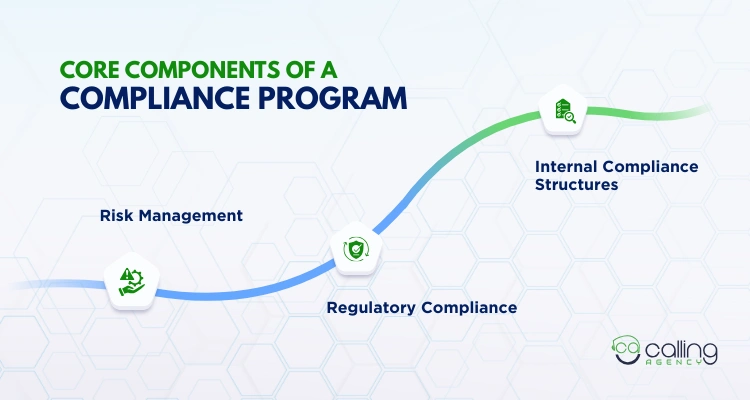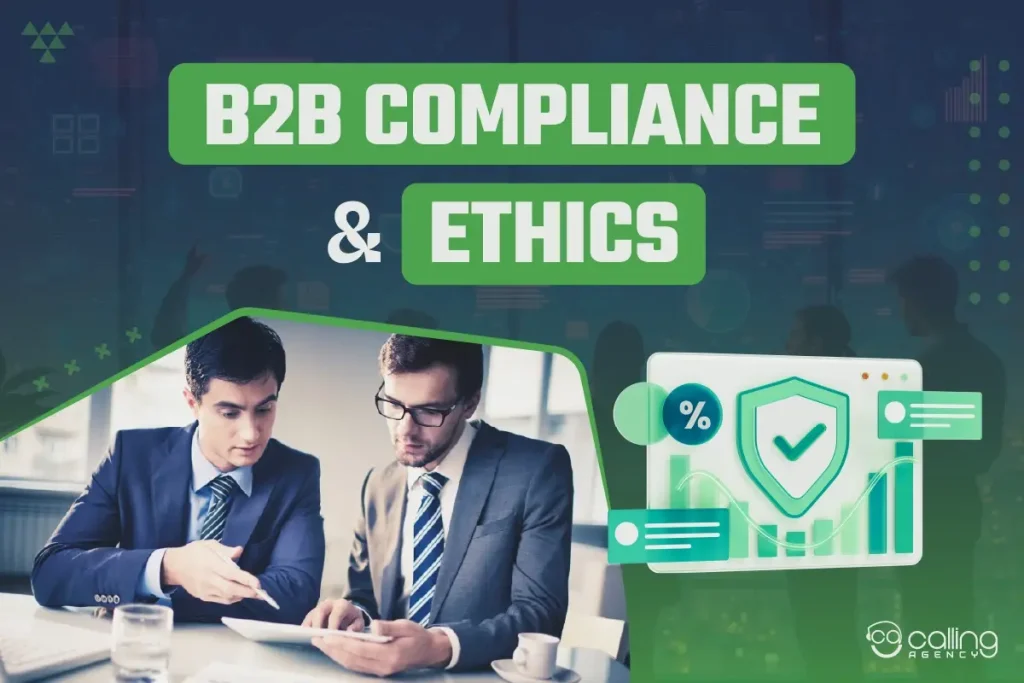Business-to-business compliance refers to the adherence to business regulations and laws; on the other hand, ethics is the decision-making that is morally sound beyond legal requirements.
Both compliance and ethics are very basic and mandatory requirements to build relationships, long-term growth, trust, and brand value. In this article, we will discuss B2B compliance and ethics with its best practices and frameworks. So without wasting time, let’s get started.
Core Components of a Compliance Program
The compliance program of a B2B company follows internal policies and procedures designed to ensure compliance with the law, rules, and regulations. Especially for the b2b lead generation service, it’s necessary to maintain compliance and ethics for clients’ trustworthiness. A compliance program built with some core components like risk management, privacy law, regulatory compliance, and internal structure. Let’s break them down in a nutshell.

Risk Management
Risk management is a B2B compliance program that determines several factors, such as industry, size, and geographical location, to assess the likelihood and impact of non-compliance. According to the Reuters survey, every company faces 234 regulatory alerts every single day.
Compliance regulatory focuses on government-mandated rules like GDPR for data protection or Sarbanes-Oxley for financial reporting. After filtering and identifying the risk, a company or organization can use the outcome to impose a risk management strategy.
Regulatory Compliance
Regulatory compliance makes sure that a company follows the rules of the government or any non-governmental board that ensures the various laws, regulations, policies, procedures, and standards.
Those standards are the restrictions on unethical or illegal practices that could harm employees, B2B buyers, customers, or the general public. Let’s take a look at an overview of how you can keep an eye on regulatory compliance.
Conducting Audits: regularly review the marketing materials, data handling practices, and advertising campaigns to make sure that they meet current legal standards of the Digital Act and government regulations.
Employee tracking: ensure employees do not break regulations and keep data privacy following consumer rules by providing proper training sessions.
Collaborating with legal experts: Legal experts can help you adhere to the complex regulations on product launches, new campaigns, and international marketing efforts.
Use of technology: using advanced technology can reduce human error in simple to complex regulations that can be missed by a new or indifferent employee.
Keep documentation: documentation in regulatory compliance is very important. Keep a record of previous mistakes or attempts. So, for further actions, it can be effective to correct and use it for training as well.
Internal Compliance Structures
Keeping a modality or compliance structure created by your organization is important, but it has to be compatible with the government standard.
Internal compliance policy reduces risk and protects the company’s reputation, and, in a regular review, it is also important to update the structure of policies and conflicts with new regulations. Let’s see how many of your internal complexities look alike in the points below:
- Anti harassment policy
- Data privacy policy
- Code of Conduct
Those are common internal conflicts that can be structured by the company with requirements types, but must be compatible with local government or international regulations.
Designing Effective Ethics Programs for B2B Environments
Designing an effective ethics program for a B2B environment includes clear ethical guidelines, employee training, strong leadership, and strong reporting mechanisms. A successful ethics program defines cultural integrity, transparency, positive reputation, strong customer relationships, etc.
Corporate Ethics & Integrity Programs
Corporate ethics and integrity are the most important virtual assets for a company. It includes ethical guidelines, transparency, behaviors, and a culture of accountability. Let’s see a sample of corporate ethics and integrity programs.
- Anti-Burberry or corruption
- Conflicts of interest
- Fair competitions
- Data privacy and cybersecurity
- Workplace diversity and inclusion
- Anti harassment and discrimination
If your organization provides proper training and educates employees about the corporate culture, then it will have a positive impact on them, and corporate ethics and integrity will bring better results in production, work environment, and overall improvement of growth and benefits.
Ethics Training Framework
Ethics is mostly a personal quality of a human being, but every company should conduct an ethics training framework to let everyone know about it.
Those who have invested in ethics training and soft skills have gained up to 317% return on investment. These statistics determine the evaluation of ethics training. Let’s take a look at some key components of the ethics training framework.
- Assessment
- Education and training
- Monitoring and evaluation
- Leadership commitment
- Implementation and commitment
Implementing an ethical framework in a B2B environment can impose strong integrity, trust, and long-term success.
Establishing Governance Structures for Oversight and Accountability
Establishing a governance structure for oversight and accountability involves clear roles and responsibilities, internal control, transparency, reporting lines, ethical conduct, etc. Creating an ethical framework that we discussed earlier is also a component of the governance structure.
Policies & Reporting Mechanisms
Policies and a smooth mechanism of reporting are a core component of corporate compliance. Reporting mechanisms and policies encourage cultural ethics and accountability.
This mechanism enables misconduct by employees and other stakeholders to be addressed internally, ensuring timely responses and preventing potential harm to the organization and the public. Let’s see some key components of this system.
- Internal reporting policies
- Whistleblowing
- Reporting channels
- Protection against retaliation
The above key component and the complete policies and reporting mechanism ensure a clear procedure for report handling.
Compliance Governance Structure
Compliance governance is a leadership role where someone is responsible for ensuring risks are mitigated, complying with privacy law and regulation, and framework design. For instance, the structure of compliance governance can be built on a strategy of avoiding fraud risk management.
Compliance governance structure should include regular vulnerability assessments, cybersecurity measures, data encryption, such as secure information systems, employee awareness training, and incident response plans.
Auditing and Improving Your Compliance & Ethics Framework
Auditing and improving your compliance and ethics framework is a necessary thing for a company. Behind every strong ethical company, there is an auditing system or ethics framework that works to shape everyone’s ethics, and that all makes a company great. Performing a routine audit not only improves a company’s ethics but also the entire system.
Every auditor is aware that internal controls are best practices and essential for maintaining adherence to relevant rules and regulations, as well as for establishing a system of checks and balances to identify improper transactions. People will, however, discover methods to go around internal controls, policies, and procedures if there is no culture of ethics and compliance.
Conclusion
B2B compliance and ethics can push you forward for long-term growth, revenue by maintaining better relationships with your customers, and also improve the workplace environment as your employees get ethics training, and by implementing that, they can also apply it to their personal lives. For B2B companies, ethics are not only bound in the corporate sector, but they also have a positive impact on your life.





